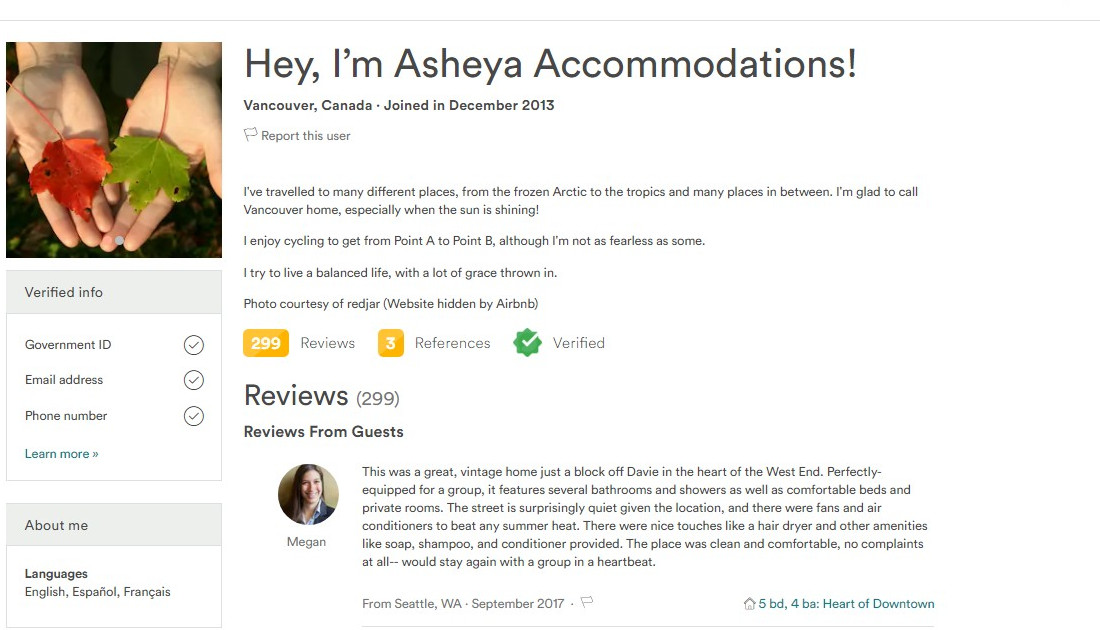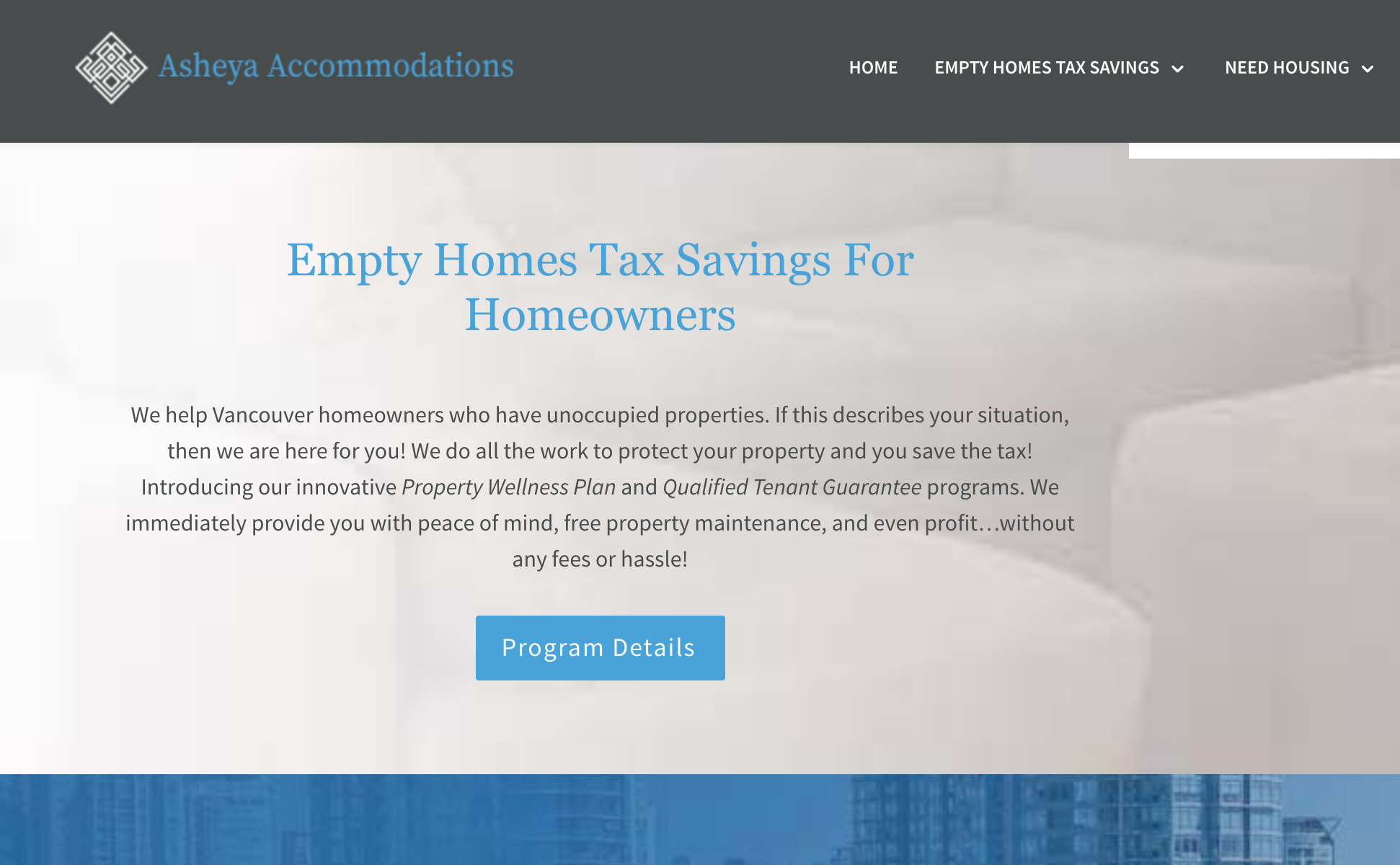Airbnb profile linked to Empty Homes Tax dodging scheme disappears as advocates pile on the pressure

By Drew Penner
Affordable housing advocates are up in arms about a businesses they worry is harnessing the power of what they consider two of the Vancouver’s greatest woes – investment properties sitting empty and the rise of short-term vacation rentals.
But the company in the line of fire, Asheya Accommodations, says the accusations are unfair. They say they’re just trying to do what they can to help fix Vancouver’s housing crunch.
“We wanted to come up with a program that would address some of these concerns that homeowners have,” said owner-operator Asheya Kassner, of their efforts to coax properties onto the market. “Our business model is we rent homes in Vancouver.”
However, Asheya.com website has disclaimer at the very bottom saying “We are not a property management company.”
Asheya promises to connect homeowners seeking to avoid the new Empty Home Tax with renters, many of whom would be expected to vacate promises within a set amount of time.
On its homepage, the company advertises “Empty Homes Tax Savings For Homeowners” and on Facebook promises “Homeowners with currently empty homes can take advantage of our Guaranteed Rental Income, FlexLease, and Boxing & Storage programs” to dodge the burden of that same tax.
It’s something that doesn’t sit right with Ulrike Rodrigues, a housing advocate who has spoken at City Council on multiple occasions.
“The situation with Asheya.com is it’s a bit of a double if not triple whammy,” she said. “They’re profiting from making residential housing into accommodations for tourists.”
She hasn’t heard back since she messaged Asheya to ask about the minimum number of days she can stay as a renter.
But when ThinkPol contacted the business, it told us they aren’t marketing houses to vacationers and do abide by the 30-day minimum.
Kassner says she set up Asheya.com to help bridge the gap between people who have properties that could be rented out and quality tenants who need a place to live.
Kassner considers the company to be part of the solution to housing affordability, not part of the problem.
“The website is really geared towards homeowners,” she said. “I’m trying to appeal to people who haven’t put their houses up for rent.”
Asheya Accommodations emerged from a time when she had to move four times in five years due to the tough Vancouver market.
“I actually started this business because I have kids,” she said, referring to how hard it can be for a family to find a good place to stay. “I started furnishing and renting out rooms in the house I was living in.”
Now Kassner is aiming to help homeowners overcome the barriers to getting involved in the rental market, which she says can be significant.
Often they’re concerned about problem renters, or want to retain the ability to visit the property for a set amount of time each year.
Kassner says the company does not currently have a profile on Airbnb or source renters from other similar sites.
But Rodrigues sent Thinkpol a screenshot she says snapped Friday afternoon of Asheya’s active Airbnb presence, hours after we left a message with Asheya. By the time we looked for the profile that evening, the page had been hidden.
People “drank the Kool-Aid” about Airbnb and believe they have the right to run shady commercial businesses out of their house, considering they don’t have the proper licenses or zoning in place, Rodrigues charges.
“A lot of Airbnb hosts say they need extra money,” she said. “I would argue that running a meth lab or a grow-op or prostitution out of their home is also a way to make extra money.”
But, she says she feels like the City Council has been listening to her concerns.
The elected officials recently voted to introduce rules she’s been pushing for, such as requiring a permit number be displayed when hosts advertise properties on short-term rental sites, which should help enforcers gather evidence about rule breakers.
“Let’s all work together and sort this out as a community,” she said.
Someone who knows a thing or two about community housing is Quentin Wright, the executive director of Mole Hill, a non-profit housing society that leases 28 properties from the City of Vancouver.
He isn’t as thrilled about the City’s reaction to short-term rentals.
“There’s thousands of suites operating in breach of city bylaws,” he said. “The City hasn’t done much about it.”
Wright says it’s too soon to say whether the Empty Home Tax will have an impact, but says Asheya and others prove the City of Vancouver’s fiscal policy is driving some companies to find new loopholes.
“Asheya Accommodations is a commercial Airbnb operation,” he said, pointing to the irony of a municipal tax meant to make long-term rentals more affordable potentially diverting housing stock towards short-termers. “This is an example of where it’s failing. What it’s actually encouraging them to do is run illegal businesses from it.”
Plus, he says the City knows about it, because he told them, as evidenced by the email we found in a freedom of information request[1]http://vancouver.ca/files/cov/2016-063-release.pdf.
“What I’ve done is tried to bring it to the attention of the City,” he said. “I told the city three or four months ago that I was aware of companies that were advertising services to avoid the Empty Homes Tax.”
He is still waiting to see if the City will take action.
“It doesn’t matter how many modular housing developments they put up it’s not going to help with the housing in Vancouver,” he said, adding an additional personal observation on the affordability crisis. “More people are being evicted every month than new housing that’s being created.”
Kassner says many students and others could be perfect candidates to live in homes deeded to offshore owners who still want to vacation in Vancouver at some point during the year.
She believes it will take innovations from companies like hers to help fix Vancouver’s housing crunch.
“We know there’s a lot of empty condos,” she said, adding they offer a two-month rental reimbursement guarantee to turn hesitant homeowners into landlords. “Our program is designed to help people bring empty houses to the market.”
References
| 1. | ↑ | http://vancouver.ca/files/cov/2016-063-release.pdf |





